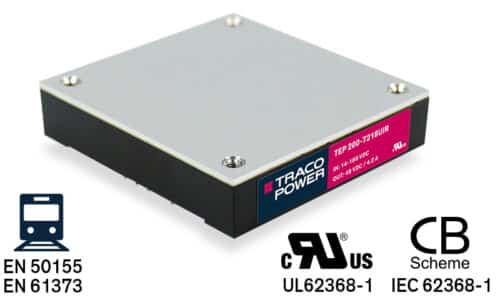Series set a new standard in railway-certified DC/DC converters, combining extensive certifications, advanced protective features, and robust design to meet the highest reliability standards in the industry.

Tarco Power has launched the new TEP 150UIR and TEP 200UIR series of railway-certified DC/DC converters, offering robust performance in demanding environments. Housed in a compact half-brick casing, these converters are versatile for a variety of nominal system voltages with a single design.Their fully encapsulated design enhances durability and protection against environmental factors. A dedicated holdup capacitor connection ensures they meet extended holdup-time requirements without needing large input capacitors, optimizing space and efficiency.
The key features include:
- Designed to operate in harsh conditions
- Functions effectively within a temperature range of –40°C to +105°C
- Housed in a compact half-brick casing (2.3” x 2.3” x 0.5”)
- Ultra-wide 12:1 input voltage range from 14 to 160 VDC
Both series are certified to EN 50155 for rolling stock applications, ensuring compliance with stringent railway standards. Additionally, they are certified to EN 61373 for mechanical shock and vibration, EN 45545-2 for fire behavior, and IEC/EN/UL 62368-1 for IT and general-purpose industrial applications, demonstrating their versatility and reliability across multiple sectors.
The series feature up to 3,000 VAC input/output isolation, providing robust protection and operational safety. They come equipped with remote on/off and trim functions, offering flexibility and control in various applications. Protection features include safeguards against short-circuits (SCP), overvoltage (OVP), and overtemperature (OTP), ensuring the converters’ longevity and reliability. They have 3-year product warranty, underscoring the manufacturer’s confidence in their durability and performance. This makes the TEP 150UIR and TEP 200UIR ideal choices for application engineers seeking reliable, high-performance solutions in the most challenging conditions.
For more information, click here.






